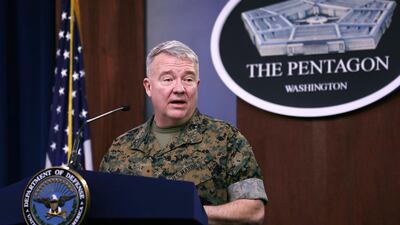Washington is "prepared to react" if Tehran launches an attack to mark the first anniversary of the killing of powerful Iranian Gen Qassem Suleimani, the head of US forces in the Middle East said.
"We are prepared to defend ourselves, our friends and partners in the region, and we're prepared to react if necessary," Gen Kenneth McKenzie, who heads the US Central Command, said.
He was touring the region weeks before the first anniversary of the January 3 killing of Suleimani by a US drone strike near Baghdad airport.
"My assessment is we are in a very good position and we'll be prepared for anything the Iranians or their proxies acting for them might choose to do," Gen McKenzie, a four-star marine general, said from an undisclosed location in the region.
The commander said he had recently visited Baghdad, where he met the head of the anti-extremist coalition, US Gen Paul Calvert, as well as the Iraqi army chief of staff, Gen Abdul Amir Yarallah.
Gen McKenzie said he had been to Syria to meet American forces stationed in the small southern base at Al Tanf, near the border between Jordan and Iraq.
In an apparent sign of US military leaders' concerns about Iranian intentions after Suleimani's killing, Gen McKenzie's current tour was not announced in advance.
Similarly, last week's visits by Gen Mark Milley, the chairman of the US Joint Chiefs of Staff, to Qatar, Saudi Arabia, the UAE, Israel and Afghanistan were kept secret until he had left the region.
"I talk to my commanders about it every day and I think we will be ready," Gen McKenzie said.
Even as the US Army continues troop withdrawals from Iraq and Afghanistan ordered by President Donald Trump – with a goal of drawing down to 2,500 in each country by January 15 – the Pentagon has substantially reinforced its posture around Iraq to dissuade Iran from launching any attack.
The aircraft carrier USS Nimitz has been patrolling Gulf waters since late November, and two American B-52 bombers recently flew over the region in a demonstration of strength clearly aimed at Iran and its allies.
Still, a volley of rockets exploded on Sunday near the US embassy in Baghdad, causing material damage but no casualties, according to Iraqi security forces.
It was the third attack on American military and diplomatic installations in Iraq since an indefinite truce was agreed with pro-Iran groups in October.








